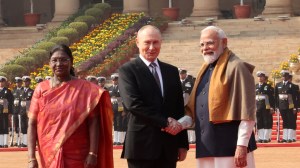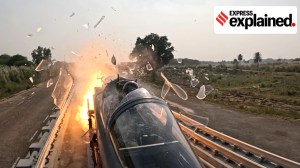Bullish on India in UN, US says let’s work together
Charting a comprehensive agenda to cement Indo-US ties, visiting US Under Secretary of State for Political Affairs R Nicholas Burns today sa...

Charting a comprehensive agenda to cement Indo-US ties, visiting US Under Secretary of State for Political Affairs R Nicholas Burns today said that India was perfectly eligible in its application for a permanent seat on an expanded UN Security Council.
Though the US has come closer to endorsing India’s candidature, discussions on civilian nuclear energy cooperation remained inconclusive today and will continue.
Burns, who had a three-hour meeting with Foreign Secretary Shyam Saran, hinted that India fulfilled virtually all criteria the US State Department had set out last week.
‘‘We introduced a new element last week. We feel any new permanent member (of UNSC) should be supremely well qualified. We support Japan, and we could support two or so more countries for permanent seats. It is an evolutionary debate,’’ Burns said.
‘‘We respect the Indian view and are open to expansion of the Council with possibly two more permanent members and two-three more non-permanent members. We place great importance on countries of this region.’’
Emphasising that any expansion of the UNSC had to make it more efficient, Burns denied that the US was trying to introduce faultlines in the G-4 group.
‘‘We are trying to unite the G-4 proposals with the others we have received. We recognise the ambitions of the developing world. We could never exclude the possibility of having a developed country as a permanent member on the UNSC,’’ he said.
While Burns’ visit was an exercise in charting the ‘‘absolute breadth of issues that should be raised’’ when Prime Minister Manmohan Singh visits the US next month, the Under Secretary had a comprehensive list of proposals for New Delhi. Washington, significantly, wants all these under the aegis of the UN:
• Washington wants an Indo-US advocacy group under the UN on ‘democratisation’ of the world. Specific initiatives discussed today will come up when Singh meets Bush on July 18
• An Indo-US fund for democracy under the UN
• Arrive at more comprehensive agreements on the Convention on Terrorism
• Deeply impressed with the Indian armed forces after the tsunami, the US now wants a UN-backed Indo-US joint disaster relief action group
• The Bush Administration wants deeper dialogue on agriculture cooperation with joint research
• Progress military relationship to the level where Indo-US joint peacekeeping operations is the buzzword for post-conflict situations
• A peace-building commission to help war-torn countries
• A coordinated Indo-US task force under the UN to propagate conservation, protection of the environment and wildlife in South Asia
• Continue progressive joint efforts under the UN on HIV/AIDS; Washington wants India’s cooperation in helping spread awareness in Africa and Latin America under UN programmes
‘‘The Indo-US relationship is unlike any other in this region. We now need to get over the legacy of work we haven’t done together in the past so we can move ahead. Secretary Rice has said she wants to see the Next Steps in Strategic Partnership move quicker than they are at present,’’ Burns said.
He made it clear that unlike the myriad proposals that had been put up to Washington, it favoured a ‘‘modest and pragmatic expansion’’ of the UNSC.
‘‘We are observing the continuing canvassing of other members. The President has not yet made a decision, so we have to wait for the debate to unfold. But we recognise India’s global importance. The next few years in our relationship will be fundamentally different.’’
Speaking on the PM’s visit to Washington in July, Burns said: ‘‘He will be our most honoured guest. There will be more on the agenda than ever before. We both now have a sense of our global responsibilities. It is in our interest to work together,’’ he said.
Here on a two-day visit, Burns will meet National Security Advisor M K Narayanan and Planning Commission Deputy Chairman Montek Singh Ahluwalia tomorrow before leaving for Dhaka.
- 01
- 02
- 03
- 04
- 05































